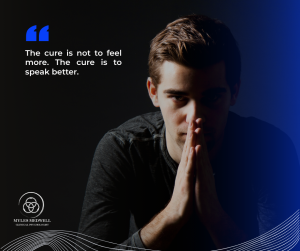The Mind Matters: Why Mental Health Deserves Your Attention
In today’s fast-paced world, we often prioritise work, physical health, and daily responsibilities – yet mental health still tends to fall to the bottom of the list. But here’s the truth: your mind is just as important as your body. Just like you would see a doctor for a physical illness, caring for your mental wellbeing is crucial to living a fulfilled and balanced life.
If you’ve been feeling stressed, anxious, overwhelmed, or simply not yourself lately, you’re not alone. In fact, mental health challenges affect millions of Australians every year. The good news? Help is available. And know this…reaching out is a sign of strength, not weakness.

What Is Mental Health and Why Is It Important?
Mental health includes your emotional, psychological, and social wellbeing. It influences how you think, feel, and behave, how you cope with stress, relate to others, and make decisions.
When your mental health is strong, you tend to feel more in control of your emotions. You’re better equipped to handle life’s ups and downs, your relationships often improve, and your physical health can benefit as well.
On the other hand, poor mental health can manifest as persistent sadness, lack of motivation, irritability, fatigue, or even physical symptoms like headaches or stomach problems.
The Stigma Is Disappearing – And That’s a Good Thing
One of the main reasons people avoid seeking help is stigma. The outdated belief that mental illness is something to be ashamed of. Fortunately, this is changing. Talking to a psychologist has become more common and accepted. Just like seeing a personal trainer or dietitian, consulting with a mental health professional is simply a proactive step toward feeling better.
Clinical psychologists work to normalise therapy as part of self-care. Whether you are navigating anxiety, depression, burnout, trauma, or something you can’t quite name, therapy is a space to be heard without judgment.
Common Signs You Might Need Support
Sometimes, it’s hard to tell if you’re “just stressed” or if it’s something deeper. Here are a few signs it might be time to speak with a psychologist:
- Persistent feelings of sadness or emptiness
- Feeling overwhelmed by daily tasks
- Trouble sleeping or sleeping too much
- Loss of interest in things you once enjoyed
- Difficulty concentrating or making decisions
- A sense of disconnection from others or yourself
You don’t need to wait for a crisis. Therapy isn’t only for those with a diagnosed mental health condition. It is for anyone who wants to understand themselves better and lead a more meaningful life.

How Psychoanalytic Therapy Can Help
Psychoanalytic therapy offers a unique framework for understanding how our past shapes the way we feel, think, and act in the present. Through this approach, you can gain insight into patterns and dynamics that may be outside of conscious awareness, yet profoundly influence your relationships, self-image, and daily life. By exploring these deeper layers of experience with a trained psychologist, you open the door to lasting emotional change, greater self-understanding, and a more authentic sense of wellbeing.
The Cost of Not Taking Care of Your Mental Health
Untreated mental health issues don’t just “go away.” They can build gradually, often unnoticed, until they start interfering with work, relationships, and even physical health. For instance, someone dealing with ongoing stress might begin experiencing chronic headaches, fatigue, or irritability. Over time, they may find it difficult to meet deadlines at work, stay engaged in personal relationships, or even enjoy activities they once loved.
Stress alone has been linked to high blood pressure, heart disease, and weakened immune systems. These physical consequences often go hand in hand with emotional strain, creating a cycle that’s hard to break without support.
By investing time in your mental wellbeing, you’re taking proactive steps to protect every aspect of your life. You can do this through therapy, self-reflection, or healthy lifestyle changes. Therapy isn’t just an expense; it’s one of the most important investments you can make in your long-term health, clarity, and resilience.
Ready to Prioritise Your Mental Health?
Taking the first step is often the hardest – but it’s also the most powerful. If you’re ready to feel better, get support, or just explore what’s going on beneath the surface, please get in touch.
📩 Email Myles today to book your first session or learn more about available services.




